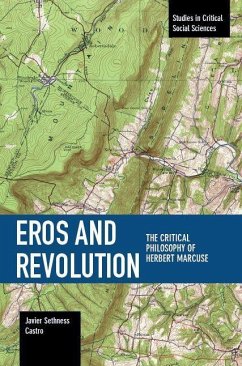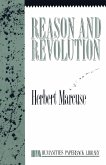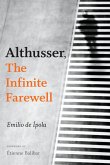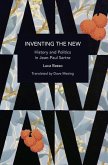- Broschiertes Buch
- Merkliste
- Auf die Merkliste
- Bewerten Bewerten
- Teilen
- Produkt teilen
- Produkterinnerung
- Produkterinnerung
In Eros and Revolution, Javier Castro presents a comprehensive intellectual and political biography of the world-renowned critical theorist Herbert Marcuse
Andere Kunden interessierten sich auch für
![Reason and Revolution Reason and Revolution]() Herbert MarcuseReason and Revolution44,99 €
Herbert MarcuseReason and Revolution44,99 €![Heidegger's Entscheidung Heidegger's Entscheidung]() Norman K. SwazoHeidegger's Entscheidung37,99 €
Norman K. SwazoHeidegger's Entscheidung37,99 €![Hannah Arendt Hannah Arendt]() Julia KristevaHannah Arendt25,99 €
Julia KristevaHannah Arendt25,99 €![Althusser, The Infinite Farewell Althusser, The Infinite Farewell]() Emilio de ÍpolaAlthusser, The Infinite Farewell32,99 €
Emilio de ÍpolaAlthusser, The Infinite Farewell32,99 €![Inventing the New Inventing the New]() Luca BassoInventing the New24,99 €
Luca BassoInventing the New24,99 €![The Passion of Michel Foucault The Passion of Michel Foucault]() James MillerThe Passion of Michel Foucault21,99 €
James MillerThe Passion of Michel Foucault21,99 €![The Nietzsche-Wagner Correspondence The Nietzsche-Wagner Correspondence]() Friedrich Wilhelm NietzscheThe Nietzsche-Wagner Correspondence27,99 €
Friedrich Wilhelm NietzscheThe Nietzsche-Wagner Correspondence27,99 €-
-
-
In Eros and Revolution, Javier Castro presents a comprehensive intellectual and political biography of the world-renowned critical theorist Herbert Marcuse
Hinweis: Dieser Artikel kann nur an eine deutsche Lieferadresse ausgeliefert werden.
Hinweis: Dieser Artikel kann nur an eine deutsche Lieferadresse ausgeliefert werden.
Produktdetails
- Produktdetails
- Verlag: Haymarket Books
- Seitenzahl: 422
- Erscheinungstermin: 20. Februar 2018
- Englisch
- Abmessung: 226mm x 150mm x 25mm
- Gewicht: 567g
- ISBN-13: 9781608468065
- ISBN-10: 1608468062
- Artikelnr.: 46295791
- Herstellerkennzeichnung
- Produktsicherheitsverantwortliche/r
- Europaallee 1
- 36244 Bad Hersfeld
- gpsr@libri.de
- Verlag: Haymarket Books
- Seitenzahl: 422
- Erscheinungstermin: 20. Februar 2018
- Englisch
- Abmessung: 226mm x 150mm x 25mm
- Gewicht: 567g
- ISBN-13: 9781608468065
- ISBN-10: 1608468062
- Artikelnr.: 46295791
- Herstellerkennzeichnung
- Produktsicherheitsverantwortliche/r
- Europaallee 1
- 36244 Bad Hersfeld
- gpsr@libri.de
Javier Sethness Castro, MSc. (2008), London School of Economics, is the author of Imperiled Life: Revolution against Climate Catastrophe (Institute for Anarchist Studies/AK Press, 2012) and For a Free Nature: Critical Theory, Social Ecology, and Post-Developmentalism (Lambert Academic Press, 2013). He contributed to Multidimensional Marcuse: Radical Thought/Action Today (Palgrave-MacMillan, forthcoming) and has participated in several International Herbert Marcuse Society conferences.
Acknowledgements
1. Introduction: Marcuse, the Utopian
Idealism, Materialism, Romanticism, and Judaism
Marcuse's Importance for Radical Politics Today
PART I: MARCUSE'S LIFE, 1898-1979
2. Early Years: Childhood and Youth, War and Revolution, Romanticism,
Utopian Socialism, Hegel, Marx, and Heidegger
Childhood and Youth, War and Revolution
Post-War Investigations: Aesthetics, German Romanticism, and Hegel
Friedrich Schiller and Charles Fourier: Utopian Socialism
Marcuse's Torturous Relationship with Heidegger
Heideggerian Marxism
Hegel's Ontology and the Theory of Historicity (1932)
Hitler's Accession and Flight of the Marcuse Family and the Frankfurt
School
3. Militant Theorizing in Resistance to Fascism, 1933-1945
Negations (1934-1938)
Studies on Authority and Family
Marcuse's Direct Investigations of Nazism
Early Theories of Social Change
The Progression of Marcuse's Thought on Art's Functions Under Fascism
Reason and Revolution (1941)
4. State, Freud, and Orphic Marxism: 1945-1960
Post-War Studies: "33 Theses," Francis Bacon, Lukács, Goethe, Friedrich
Hölderin, and Erasmus
Continued Investigations of Historical Progress, Russian Studies, and the
Trajectory of Communism and Reason during the Early Cold War
Communism and Reason during the Early Cold War
On Sartre's Existentialism
Orphic Marxism and the Struggle of Eros against Thanatos
Lectures on Freedom and Progress in Freud's Theory of the Instincts
Marcuse's Debate with Fromm on Freud, Therapy, and Adjustment
Soviet Marxism: A Critical Analysis (1958)
The Ideology of Death
5. Radical Struggle in the 1960s
Marcuse on Cuba
Continued Engagement with Critical Theorists and Lecture on Weber
Humanism, Feminism, and Revolution
Critical Reflections on Science and Technology
One-Dimensional Humanity: Diagnosis, Reflections, and Recommendations
Marcuse on Marx, Louis Napoleon, and Benjamin
Justification of Revolutionary Praxis: "Repressive Tolerance," "Ethics and
Revolution," Guerrilla Warfare, "The Question of Revolution," and "Thoughts
on the Defense of Gracchus Babeuf"
Psychoanalytical Interventions
Activism against the Vietnam War
Summer 1967 Lectures before the German SDS and Congress of the Dialectics
of Liberation: On Utopia, Radical Opposition, and Violence
1968: A New Dawn for Humanity?
An Essay on Liberation (1969)
Other Interventions from 1969: On Student Protest, "The Relevance of
Reality," Qualitative Change, and Self-Determination
The 1969 Debate with Adorno on Theory and Praxis
Revisiting "Repressive Tolerance" and Civil Rights with the ACLU and Fred
Schwarz of the Christian Anti-Communist Crusade
"Marxism and the New Humanity: An Unfinished Revolution"
"Freedom and the Historical Imperative"
6. Marcuse's Final Decade: Continuities, Discontinuities, and
Intensification (1970-1979)
Marcuse's Assessment of the State of the Radical Opposition in the Early
1970s: "Cultural Revolution," "The Movement in a New Age of Repression,"
and "A Revolution in Values"
Revolution or Reform? Marcuse's Debate with Popper
Counterrevolution and Revolt (1972)
Marcuse's Late Championing of Feminism
International Relations: Vietnam and Israel/Palestine
Continued Engagement with Aesthetics
"It is Right to Revolt" and "Theory and Politics": Late Discussions with
Sartre and Habermas
Marcuse's Final Interventions in Life: On Political Violence, the New Left,
the U.S.Bicentennial, "The Reification of the Proletariat," Rudolf Bahro,
Technology, and Ecology
The Aesthetic Dimension (1978)
PART II: REFLECTIONS ON MARCUSE
7. Nature and Revolution
Nature, Evolution, and Morality
"Repressive Tolerance" and Radical Struggle for Animal and Earth Liberation
Today
Conclusion
8. Critique of Marcuse
The Limits to Integration
The Problem of Sources: Political Philosophy and Empirics
Marcuse the Edelkommunist
Marcuse the Zionist?
Feminism, Gender, Eros
Conflicts with Poststructuralism and Postmodernism
Marcuse on Authority and the Transition: Between Jacobinism and Anarchism
PART III: CONCLUSION
9. Marcusean Politics in the Twenty-First Century
Radical Ecological Politics
Feminist Socialism and Anarcha-Feminism
The "World Mind" in International Relations: Global Anti-Authoritarianism
Means and Ends: The Question of Counter-Violence
Close: Eros and Revolution
References
Index
1. Introduction: Marcuse, the Utopian
Idealism, Materialism, Romanticism, and Judaism
Marcuse's Importance for Radical Politics Today
PART I: MARCUSE'S LIFE, 1898-1979
2. Early Years: Childhood and Youth, War and Revolution, Romanticism,
Utopian Socialism, Hegel, Marx, and Heidegger
Childhood and Youth, War and Revolution
Post-War Investigations: Aesthetics, German Romanticism, and Hegel
Friedrich Schiller and Charles Fourier: Utopian Socialism
Marcuse's Torturous Relationship with Heidegger
Heideggerian Marxism
Hegel's Ontology and the Theory of Historicity (1932)
Hitler's Accession and Flight of the Marcuse Family and the Frankfurt
School
3. Militant Theorizing in Resistance to Fascism, 1933-1945
Negations (1934-1938)
Studies on Authority and Family
Marcuse's Direct Investigations of Nazism
Early Theories of Social Change
The Progression of Marcuse's Thought on Art's Functions Under Fascism
Reason and Revolution (1941)
4. State, Freud, and Orphic Marxism: 1945-1960
Post-War Studies: "33 Theses," Francis Bacon, Lukács, Goethe, Friedrich
Hölderin, and Erasmus
Continued Investigations of Historical Progress, Russian Studies, and the
Trajectory of Communism and Reason during the Early Cold War
Communism and Reason during the Early Cold War
On Sartre's Existentialism
Orphic Marxism and the Struggle of Eros against Thanatos
Lectures on Freedom and Progress in Freud's Theory of the Instincts
Marcuse's Debate with Fromm on Freud, Therapy, and Adjustment
Soviet Marxism: A Critical Analysis (1958)
The Ideology of Death
5. Radical Struggle in the 1960s
Marcuse on Cuba
Continued Engagement with Critical Theorists and Lecture on Weber
Humanism, Feminism, and Revolution
Critical Reflections on Science and Technology
One-Dimensional Humanity: Diagnosis, Reflections, and Recommendations
Marcuse on Marx, Louis Napoleon, and Benjamin
Justification of Revolutionary Praxis: "Repressive Tolerance," "Ethics and
Revolution," Guerrilla Warfare, "The Question of Revolution," and "Thoughts
on the Defense of Gracchus Babeuf"
Psychoanalytical Interventions
Activism against the Vietnam War
Summer 1967 Lectures before the German SDS and Congress of the Dialectics
of Liberation: On Utopia, Radical Opposition, and Violence
1968: A New Dawn for Humanity?
An Essay on Liberation (1969)
Other Interventions from 1969: On Student Protest, "The Relevance of
Reality," Qualitative Change, and Self-Determination
The 1969 Debate with Adorno on Theory and Praxis
Revisiting "Repressive Tolerance" and Civil Rights with the ACLU and Fred
Schwarz of the Christian Anti-Communist Crusade
"Marxism and the New Humanity: An Unfinished Revolution"
"Freedom and the Historical Imperative"
6. Marcuse's Final Decade: Continuities, Discontinuities, and
Intensification (1970-1979)
Marcuse's Assessment of the State of the Radical Opposition in the Early
1970s: "Cultural Revolution," "The Movement in a New Age of Repression,"
and "A Revolution in Values"
Revolution or Reform? Marcuse's Debate with Popper
Counterrevolution and Revolt (1972)
Marcuse's Late Championing of Feminism
International Relations: Vietnam and Israel/Palestine
Continued Engagement with Aesthetics
"It is Right to Revolt" and "Theory and Politics": Late Discussions with
Sartre and Habermas
Marcuse's Final Interventions in Life: On Political Violence, the New Left,
the U.S.Bicentennial, "The Reification of the Proletariat," Rudolf Bahro,
Technology, and Ecology
The Aesthetic Dimension (1978)
PART II: REFLECTIONS ON MARCUSE
7. Nature and Revolution
Nature, Evolution, and Morality
"Repressive Tolerance" and Radical Struggle for Animal and Earth Liberation
Today
Conclusion
8. Critique of Marcuse
The Limits to Integration
The Problem of Sources: Political Philosophy and Empirics
Marcuse the Edelkommunist
Marcuse the Zionist?
Feminism, Gender, Eros
Conflicts with Poststructuralism and Postmodernism
Marcuse on Authority and the Transition: Between Jacobinism and Anarchism
PART III: CONCLUSION
9. Marcusean Politics in the Twenty-First Century
Radical Ecological Politics
Feminist Socialism and Anarcha-Feminism
The "World Mind" in International Relations: Global Anti-Authoritarianism
Means and Ends: The Question of Counter-Violence
Close: Eros and Revolution
References
Index
Acknowledgements
1. Introduction: Marcuse, the Utopian
Idealism, Materialism, Romanticism, and Judaism
Marcuse's Importance for Radical Politics Today
PART I: MARCUSE'S LIFE, 1898-1979
2. Early Years: Childhood and Youth, War and Revolution, Romanticism,
Utopian Socialism, Hegel, Marx, and Heidegger
Childhood and Youth, War and Revolution
Post-War Investigations: Aesthetics, German Romanticism, and Hegel
Friedrich Schiller and Charles Fourier: Utopian Socialism
Marcuse's Torturous Relationship with Heidegger
Heideggerian Marxism
Hegel's Ontology and the Theory of Historicity (1932)
Hitler's Accession and Flight of the Marcuse Family and the Frankfurt
School
3. Militant Theorizing in Resistance to Fascism, 1933-1945
Negations (1934-1938)
Studies on Authority and Family
Marcuse's Direct Investigations of Nazism
Early Theories of Social Change
The Progression of Marcuse's Thought on Art's Functions Under Fascism
Reason and Revolution (1941)
4. State, Freud, and Orphic Marxism: 1945-1960
Post-War Studies: "33 Theses," Francis Bacon, Lukács, Goethe, Friedrich
Hölderin, and Erasmus
Continued Investigations of Historical Progress, Russian Studies, and the
Trajectory of Communism and Reason during the Early Cold War
Communism and Reason during the Early Cold War
On Sartre's Existentialism
Orphic Marxism and the Struggle of Eros against Thanatos
Lectures on Freedom and Progress in Freud's Theory of the Instincts
Marcuse's Debate with Fromm on Freud, Therapy, and Adjustment
Soviet Marxism: A Critical Analysis (1958)
The Ideology of Death
5. Radical Struggle in the 1960s
Marcuse on Cuba
Continued Engagement with Critical Theorists and Lecture on Weber
Humanism, Feminism, and Revolution
Critical Reflections on Science and Technology
One-Dimensional Humanity: Diagnosis, Reflections, and Recommendations
Marcuse on Marx, Louis Napoleon, and Benjamin
Justification of Revolutionary Praxis: "Repressive Tolerance," "Ethics and
Revolution," Guerrilla Warfare, "The Question of Revolution," and "Thoughts
on the Defense of Gracchus Babeuf"
Psychoanalytical Interventions
Activism against the Vietnam War
Summer 1967 Lectures before the German SDS and Congress of the Dialectics
of Liberation: On Utopia, Radical Opposition, and Violence
1968: A New Dawn for Humanity?
An Essay on Liberation (1969)
Other Interventions from 1969: On Student Protest, "The Relevance of
Reality," Qualitative Change, and Self-Determination
The 1969 Debate with Adorno on Theory and Praxis
Revisiting "Repressive Tolerance" and Civil Rights with the ACLU and Fred
Schwarz of the Christian Anti-Communist Crusade
"Marxism and the New Humanity: An Unfinished Revolution"
"Freedom and the Historical Imperative"
6. Marcuse's Final Decade: Continuities, Discontinuities, and
Intensification (1970-1979)
Marcuse's Assessment of the State of the Radical Opposition in the Early
1970s: "Cultural Revolution," "The Movement in a New Age of Repression,"
and "A Revolution in Values"
Revolution or Reform? Marcuse's Debate with Popper
Counterrevolution and Revolt (1972)
Marcuse's Late Championing of Feminism
International Relations: Vietnam and Israel/Palestine
Continued Engagement with Aesthetics
"It is Right to Revolt" and "Theory and Politics": Late Discussions with
Sartre and Habermas
Marcuse's Final Interventions in Life: On Political Violence, the New Left,
the U.S.Bicentennial, "The Reification of the Proletariat," Rudolf Bahro,
Technology, and Ecology
The Aesthetic Dimension (1978)
PART II: REFLECTIONS ON MARCUSE
7. Nature and Revolution
Nature, Evolution, and Morality
"Repressive Tolerance" and Radical Struggle for Animal and Earth Liberation
Today
Conclusion
8. Critique of Marcuse
The Limits to Integration
The Problem of Sources: Political Philosophy and Empirics
Marcuse the Edelkommunist
Marcuse the Zionist?
Feminism, Gender, Eros
Conflicts with Poststructuralism and Postmodernism
Marcuse on Authority and the Transition: Between Jacobinism and Anarchism
PART III: CONCLUSION
9. Marcusean Politics in the Twenty-First Century
Radical Ecological Politics
Feminist Socialism and Anarcha-Feminism
The "World Mind" in International Relations: Global Anti-Authoritarianism
Means and Ends: The Question of Counter-Violence
Close: Eros and Revolution
References
Index
1. Introduction: Marcuse, the Utopian
Idealism, Materialism, Romanticism, and Judaism
Marcuse's Importance for Radical Politics Today
PART I: MARCUSE'S LIFE, 1898-1979
2. Early Years: Childhood and Youth, War and Revolution, Romanticism,
Utopian Socialism, Hegel, Marx, and Heidegger
Childhood and Youth, War and Revolution
Post-War Investigations: Aesthetics, German Romanticism, and Hegel
Friedrich Schiller and Charles Fourier: Utopian Socialism
Marcuse's Torturous Relationship with Heidegger
Heideggerian Marxism
Hegel's Ontology and the Theory of Historicity (1932)
Hitler's Accession and Flight of the Marcuse Family and the Frankfurt
School
3. Militant Theorizing in Resistance to Fascism, 1933-1945
Negations (1934-1938)
Studies on Authority and Family
Marcuse's Direct Investigations of Nazism
Early Theories of Social Change
The Progression of Marcuse's Thought on Art's Functions Under Fascism
Reason and Revolution (1941)
4. State, Freud, and Orphic Marxism: 1945-1960
Post-War Studies: "33 Theses," Francis Bacon, Lukács, Goethe, Friedrich
Hölderin, and Erasmus
Continued Investigations of Historical Progress, Russian Studies, and the
Trajectory of Communism and Reason during the Early Cold War
Communism and Reason during the Early Cold War
On Sartre's Existentialism
Orphic Marxism and the Struggle of Eros against Thanatos
Lectures on Freedom and Progress in Freud's Theory of the Instincts
Marcuse's Debate with Fromm on Freud, Therapy, and Adjustment
Soviet Marxism: A Critical Analysis (1958)
The Ideology of Death
5. Radical Struggle in the 1960s
Marcuse on Cuba
Continued Engagement with Critical Theorists and Lecture on Weber
Humanism, Feminism, and Revolution
Critical Reflections on Science and Technology
One-Dimensional Humanity: Diagnosis, Reflections, and Recommendations
Marcuse on Marx, Louis Napoleon, and Benjamin
Justification of Revolutionary Praxis: "Repressive Tolerance," "Ethics and
Revolution," Guerrilla Warfare, "The Question of Revolution," and "Thoughts
on the Defense of Gracchus Babeuf"
Psychoanalytical Interventions
Activism against the Vietnam War
Summer 1967 Lectures before the German SDS and Congress of the Dialectics
of Liberation: On Utopia, Radical Opposition, and Violence
1968: A New Dawn for Humanity?
An Essay on Liberation (1969)
Other Interventions from 1969: On Student Protest, "The Relevance of
Reality," Qualitative Change, and Self-Determination
The 1969 Debate with Adorno on Theory and Praxis
Revisiting "Repressive Tolerance" and Civil Rights with the ACLU and Fred
Schwarz of the Christian Anti-Communist Crusade
"Marxism and the New Humanity: An Unfinished Revolution"
"Freedom and the Historical Imperative"
6. Marcuse's Final Decade: Continuities, Discontinuities, and
Intensification (1970-1979)
Marcuse's Assessment of the State of the Radical Opposition in the Early
1970s: "Cultural Revolution," "The Movement in a New Age of Repression,"
and "A Revolution in Values"
Revolution or Reform? Marcuse's Debate with Popper
Counterrevolution and Revolt (1972)
Marcuse's Late Championing of Feminism
International Relations: Vietnam and Israel/Palestine
Continued Engagement with Aesthetics
"It is Right to Revolt" and "Theory and Politics": Late Discussions with
Sartre and Habermas
Marcuse's Final Interventions in Life: On Political Violence, the New Left,
the U.S.Bicentennial, "The Reification of the Proletariat," Rudolf Bahro,
Technology, and Ecology
The Aesthetic Dimension (1978)
PART II: REFLECTIONS ON MARCUSE
7. Nature and Revolution
Nature, Evolution, and Morality
"Repressive Tolerance" and Radical Struggle for Animal and Earth Liberation
Today
Conclusion
8. Critique of Marcuse
The Limits to Integration
The Problem of Sources: Political Philosophy and Empirics
Marcuse the Edelkommunist
Marcuse the Zionist?
Feminism, Gender, Eros
Conflicts with Poststructuralism and Postmodernism
Marcuse on Authority and the Transition: Between Jacobinism and Anarchism
PART III: CONCLUSION
9. Marcusean Politics in the Twenty-First Century
Radical Ecological Politics
Feminist Socialism and Anarcha-Feminism
The "World Mind" in International Relations: Global Anti-Authoritarianism
Means and Ends: The Question of Counter-Violence
Close: Eros and Revolution
References
Index








